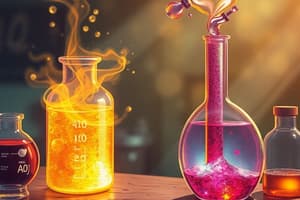Podcast
Questions and Answers
What is the product formed when metals react with dilute acids?
What is the product formed when metals react with dilute acids?
- Only water
- Only hydrogen
- Only salts
- Salts and hydrogen (correct)
Which metal shows a violent reaction with dilute acids?
Which metal shows a violent reaction with dilute acids?
- Zinc
- Sodium (correct)
- Magnesium
- Iron
Which of the following metals does not react with dilute acids?
Which of the following metals does not react with dilute acids?
- Zinc
- Iron
- Silver (correct)
- Magnesium
What is the vigorousness of the reaction as we move down the reactivity series?
What is the vigorousness of the reaction as we move down the reactivity series?
Which of the following equations represents the reaction between sodium and hydrochloric acid?
Which of the following equations represents the reaction between sodium and hydrochloric acid?
Flashcards
Metal + Dilute Acid → ?
Metal + Dilute Acid → ?
Salts and hydrogen gas are produced when metals react with dilute acids.
Which metal reacts violently with dilute acids?
Which metal reacts violently with dilute acids?
Sodium (Na) exhibits a violent reaction with dilute acids.
Metal unreactive with dilute acids
Metal unreactive with dilute acids
Silver (Ag) does not react with dilute acids.
Reactivity and the Reactivity Series
Reactivity and the Reactivity Series
Signup and view all the flashcards
Sodium and hydrochloric acid reaction equation
Sodium and hydrochloric acid reaction equation
Signup and view all the flashcards
Study Notes
Reaction with Acids
- Metals react with dilute acids like hydrochloric acid and sulphuric acid to form corresponding salts and liberate hydrogen.
- Vigorousness of the reaction decreases as we move down the reactivity series.
- Sodium and potassium react violently with acids.
- Magnesium and aluminium react quite vigorously with acids.
- Iron and zinc show moderate reaction with acids.
- Tin and lead react slowly with acids.
- Silver and gold do not react with acids at all.
Reaction Examples
- 2Na (Sodium) + 2HCl (Hydrochloric acid) → 2NaCl (Sodium chloride) + H₂ (Hydrogen)
- Mg (Magnesium) + 2HCl (Hydrochloric acid) → MgCl (Magnesium chloride) + H₂ (Hydrogen)
- Zn (Zinc) + 2HCl (Hydrochloric acid) → ZnCl (Zinc chloride) + H₂ (Hydrogen)
Special Cases
- Some metals react only with concentrated acids.
Studying That Suits You
Use AI to generate personalized quizzes and flashcards to suit your learning preferences.




